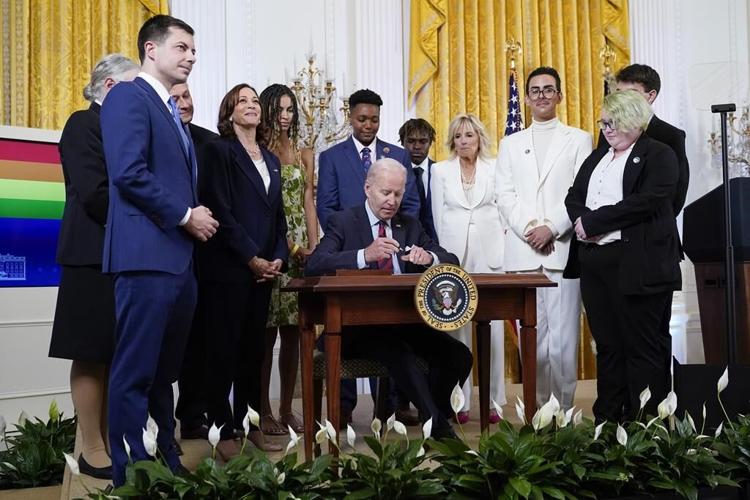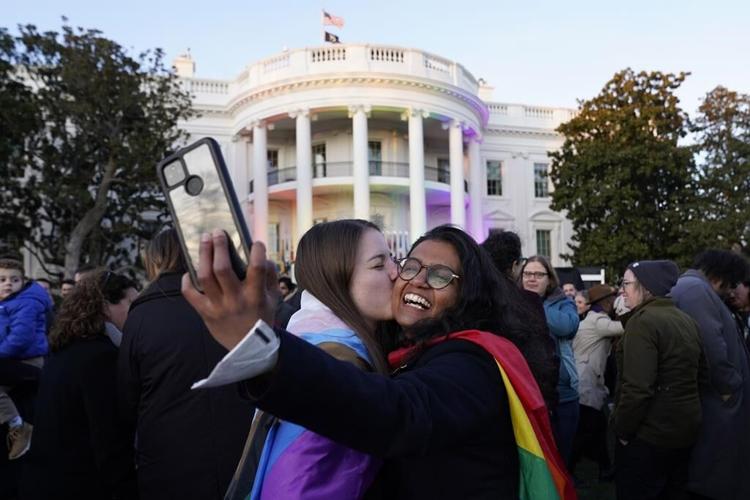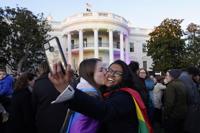WASHINGTON - "Love is love," U.S. President Joe Biden declared Tuesday as he signed into law new federal protections for same-sex marriage — a step aimed at defending civil liberties from what he described as an "extreme" Supreme Court.
Before a sprawling, rainbow-flag-brandishing crowd on the South Lawn of the White House, Biden cheered the bipartisan Respect for Marriage Act even as he warned that the high court's conservative majority is far from finished.
Congress passed the bill, he said, "because an extreme Supreme Court has stripped away the right important to millions of Americans that existed for half a century" — a reference to the seismic decision in June to overturn Roe v. Wade.
That ruling, which restored the rights of individual states to ban abortion, also included stark threats to other privacy-based human rights, Biden said, including interracial marriage and the use of contraception.
"When a person can be married in the morning and thrown out of a restaurant for being gay in the afternoon, this is still wrong," he said, imploring Congress to pass the LGBTQ civil rights bill known as the Equality Act.
"We need to challenge the hundreds of callous, cynical laws introduced in the states targeting transgender children, terrifying families and criminalizing doctors who give children the care they need.
"We have to protect these children, so they know they're loved."
Biden's warm-up acts Tuesday included not only House Speaker Nancy Pelosi, Senate Majority Leader Chuck Schumer and Vice-President Kamala Harris, but also musical interludes from Sam Smith and Cyndi Lauper.
Also among the speakers were Heidi Nortonsmith and her wife Gina, whose legal challenge a quarter-century ago helped make Massachusetts the first U.S. state to legalize same-sex marriage in 2004.
"It takes the efforts of many to bend the arc of history toward justice," Nortonsmith said. "Even now, there are so many places where people in our community are under attack. The work will continue. But look at how far we've come."
Congress introduced the Respect for Marriage Act in July, shortly after the Supreme Court decision on abortion and its concurring opinion from Justice Clarence Thomas, who suggested the court "reconsider" key rulings on contraception and same-sex rights.
Getting it promptly passed and signed took on fresh urgency after Republicans won control of the House of Representatives in last month's midterm elections.
Helen Kennedy, executive director of Egale Canada, called it a "bittersweet" moment — one that combines the joy of the milestone with the apprehension and fear that made it necessary in the first place.
"It's fantastic for the gay community in the U.S. to know that they have a president that supports them and believes in their right to exist," Kennedy said in an interview.
"At the same time, we have to think about the others who don't have those privileges, and there's still a lot of work to do."
The law, however, doesn't guarantee same-sex marriage rights; that role still rests primarily with Obergefell v. Hodges, a watershed 2015 Supreme Court decision that's among those Thomas wants to rethink.
Should it be overturned, the question of whether to issue same-sex marriage licences would revert to the states, much as the abortion decision in June resurrected long-dormant state laws restricting or outlawing the procedure.
In repealing the Defense of Marriage Act, the new law will enshrine federal recognition of same-sex marriage and require states to respect existing marriages, including those performed in other states.
The bill, however, does nothing to address a growing wave of violent crime against the LGBTQ community, including a mass shooting at a Colorado Springs nightclub last month that killed five people and injured 19.
"Our work isn't done," said Pelosi, who cited as a point of pride a number of other LGBTQ rights bills that passed during her tenure, including the 2010 repeal of the military ban on openly gay members known as "Don't Ask, Don't Tell."
"This fight is an essential thread in the fabric of our nation's history," she said. "At its core, America has always been about expanding freedom — not restricting it."
New law enforcement data released Monday painted only a partial portrait of hatred in the U.S., thanks to changes in reporting standards that kept a number of large police jurisdictions out of the 2021 data.
The climb, however, seems as steep as ever in a country rived by cultural divides and awash in escalating social, racial and ethnic tension.
Of the 7,303 hate crimes catalogued in 2021 by the FBI, the bulk of them — 62 per cent — were motivated by racial hatred. Sexual orientation was the second-largest category at 16 per cent, while four per cent involved gender identity.
The figures are a far cry from the national totals, since changes in reporting standards resulted in the exclusion of several major policing jurisdictions in Florida, New York, California and elsewhere.
Using its own statistics, the Center for the Study of Hate and Extremism at California State University, San Bernardino, issued a separate study earlier this year that found a 20 per cent increase in hate crimes across the board in 2021, including a 51 per cent spike in anti-LGBTQ crime.
That, Kennedy said, is the day-to-day reality for LGBTQ people, regardless of what the courts and lawmakers might say or do.
"When you're part of a marginalized group, you're always a target. It doesn't matter what the law says, because you haven't shifted the culture — the culture doesn't change just because there's a law in place," she said.
"We can point to the laws, and if we have the means we can use the law, but it doesn't change your day-to-day life in terms of how you navigate the world and how you navigate who you are and how you present in the world."
This report by ºÃÉ«tvwas first published Dec. 13, 2022.










































